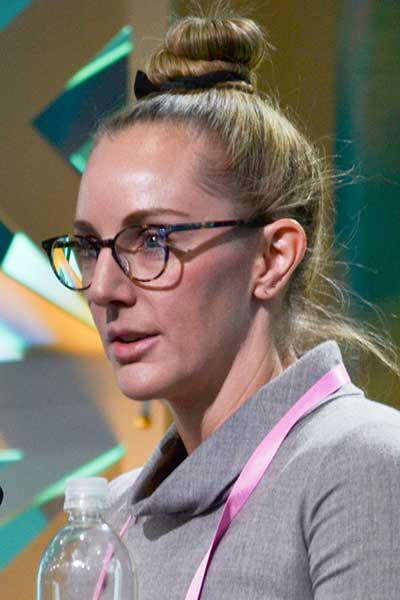Self-compassion is not necessarily innate. It is a skill we can learn and improve. Two experts who have incorporated the practice and teaching of self-compassion at their institutions offered a look into the benefits of the practice in the healthcare workforce as well as tips on how to teach the skill to others.
Self-Compassion for Rheumatology Healthcare Providers is available on demand for registered ACR Convergence 2023 participants through Oct. 31, 2024, on the meeting website.

Whitney Marvin, MD, Pediatric Critical Care Physician at Medical University of South Carolina, reminded the audience that self-compassion is essential not just to survive, but to thrive. Many medical professionals have held onto a pattern of self-criticism, not only because it was instilled in them when they were young, but because being critical is necessary in the scientific process of figuring out what is wrong with patients and fixing it.
Dr. Marvin introduced the work of Kristin Neff, PhD, who is considered “the creator of the Western theory of self-compassion.” There are three elements to self-compassion: self-kindness, common humanity, and mindfulness.
Self-compassion is different from the concept of self-esteem. The former refers to the feeling of “I am not alone,” while the latter asks the question, “How good am I?”
“Self-compassion provides a greater ability to cope with stress than self-esteem does,” Dr. Marvin said. “In multiple studies, professional caregivers and first responders who have greater self-compassion have less caregiver fatigue, burnout, and stress.”
A big part of self-compassion involves working on yourself on your own, she said. Being a friend to yourself is one step toward self-compassion. To accomplish this, Dr. Marvin advised: Speak to yourself in the same tone you would use with a friend who is dealing with something stressful. Take a self-compassion break, recognize your stress, put your hand on your heart, and remind yourself that you are not alone and you deserve patience.
“The good thing about this is you can do it as many times a day as you need,” she said.

Vaneet Sandhu, MD, MS, RhMSUS, Rheumatologist and Associate Professor of Medicine at Loma Linda University Health, said compassion is not measurable, but it can be cultivated.
“It’s a feeling, something that’s within us that’s expressed to others,” she said.
It can be an innate quality, but it can also be an acquired skill, Dr. Sandhu continued. Having compassion for yourself allows you to have compassion for your patients. Building relationships with patients, recognizing them as people rather than numbers or diseases, and connecting to them are ways to improve compassion skills.
This kind of skill takes time to develop, she said, and that can be the biggest limitation in providing compassionate care.
“But you can accomplish a lot with a simple, personal interaction,” Dr. Sandhu said.
The other side of the experience is compassion fatigue, which is not the same as burnout. It’s that feeling a healthcare provider can get when they’ve taken on a lot of emotional burden from their patients. It can lead to fear of compassion.
Dr. Sandhu referenced the fears of compassion scales, a tool for assessing the fear of compassion in others as well as in ourselves.
“The more fear we have of compassion, the more likely we are to burn out, and the more compassion we have for ourselves and for others, it is actually active in protecting against burnout,” she said.
Dr. Sandhu follows a “compassion curriculum” at her own institution and requests fellows utilize the fears of compassion scales during their training. The resulting feedback shows the fellows’ feelings are all over the place, further demonstrating that compassion is difficult to measure.
“We need to do more, but it’s hard to be structured when you’re talking about compassion,” Dr. Sandhu said.

Registered ACR Convergence 2024 Participants:
Watch the Replay
Select ACR Convergence 2024 scientific sessions are available to registered participants for on-demand viewing through October 10, 2025. Log in to the meeting website to continue your ACR Convergence experience.
